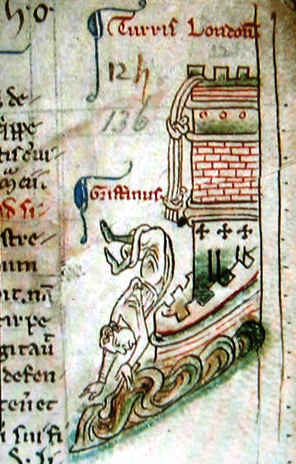Ranulf Flambard

Flambard accomplished what many of later prisoners of the Tower tried but failed – a successful escape. Depicted here is a later, unsuccessful attempt, of Prince Gruffydd of Wales, who fell to his death in 1244.
Flambard: A Fiery Personality
Ranulf Flambard, the Royal Clerk under king William Rufus (William the Conqueror's son), succeeded William de St Calais as the second Norman Bishop of Durham in 1099. His nickname, flambard, meaning fiery, probably refers to his personality: he is known to have been exuberant, sharp witted and forceful. He was an exceptionally successful crown prosecutor and a gifted and convincing speaker.
A Man of Contrasts
Flambard was a controversial figure, criticised for being cruel, hedonistic and greedy, but also praised for being generous and loyal to his supporters and to the poor, and for his success as a builder and administrator (he had a major role in building Durham Castle and fortifying Durham Peninsula). These seemingly contradictory characteristics were probably all true; like many talented and ambitious men, Flambard was probably a good person to be on the right side of, yet ruthless as an opponent.
Imprisonment and Escape
Among Flambard’s claims to fame is the fact that he was the first person known to have escaped from the Tower of London (in 1101). He had been imprisoned there the previous year following the death of king William Rufus, by the new king, Henry I (Rufus’ younger brother). Flambard was an obvious scapegoat for the alleged corruption of William Rufus’ reign.
Flambard successfully plotted his escape to Normandy, where within six months he managed to make Henry’s rival (and elder brother) Robert Curthose, appoint him as his chief of staff, and lead Robert’s army in a successful incursion across the channel.
Reconciliation and Reinstatement to the Bishopric of Durham
Flambard, perhaps a double agent, quickly became an ally of Henry’s and was reinstated as Bishop of Durham.
It is thought that his skills made him indispensable to the king, who by then no longer needing to prove himself as an antidote to his predecessor's reign.
Architectural Legacies
In addition to finding intelligent and resourceful ways of replenishing the royal coffers, two great British monuments constructed under Flambard’s patronage as minister and then as bishop survive: Westminster Hall and Durham Cathedral.
Flambard died in 1128 and was succeeded by Geoffrey Rufus.

